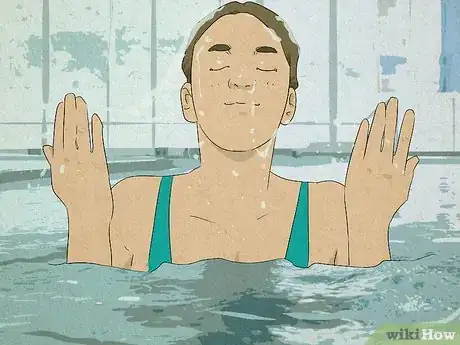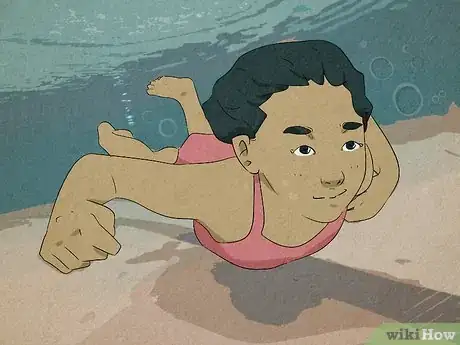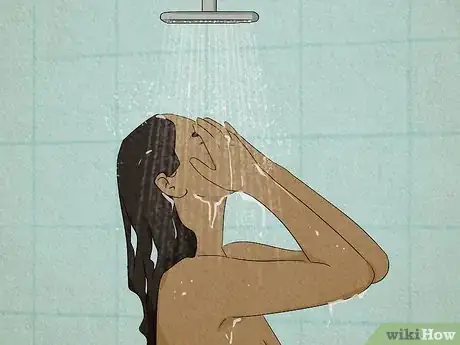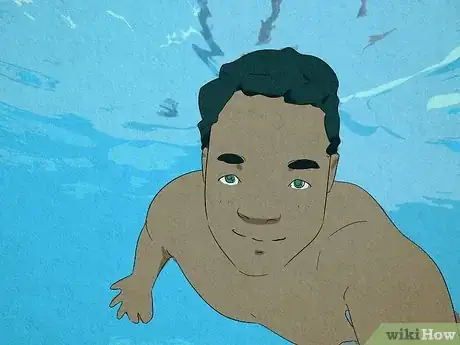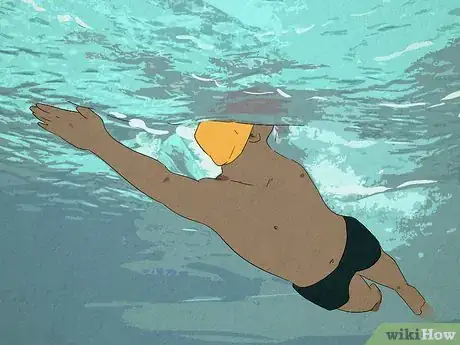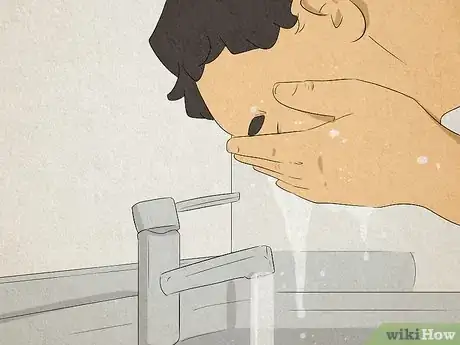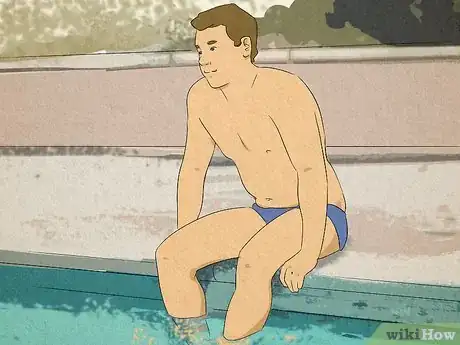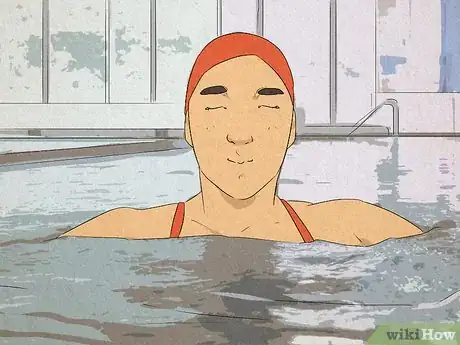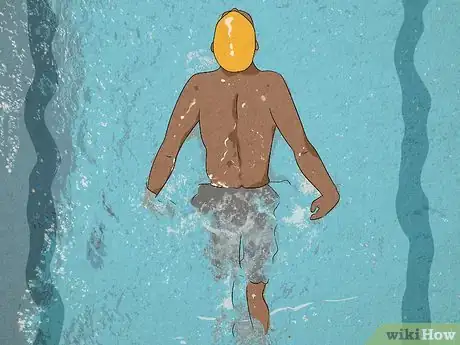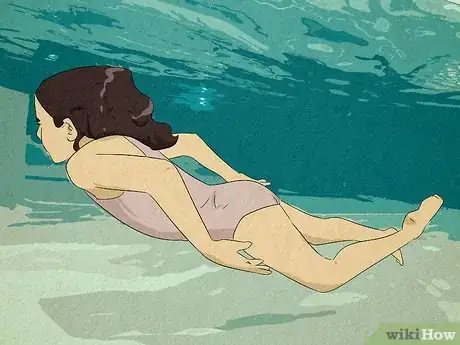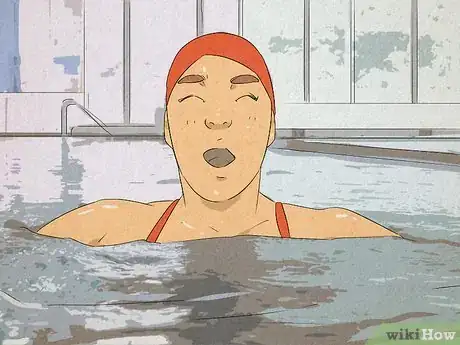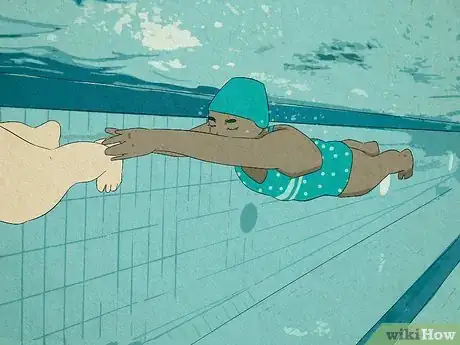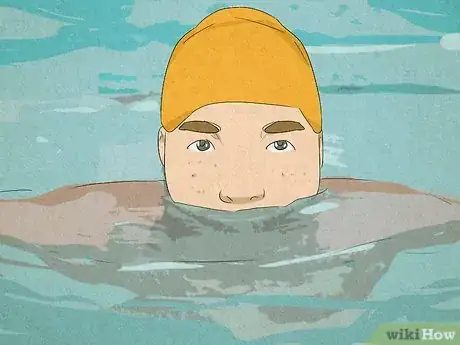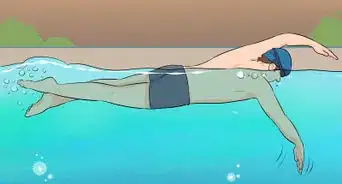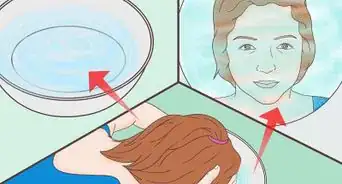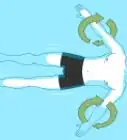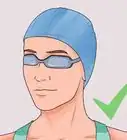This article was co-authored by Brad Hurvitz. Brad Hurvitz is a Certified Swimming Instructor for My Baby Swims, an adolescent swimming school based in La Jolla, California. Brad is trained as an Infant Swimming Resource (ISR) instructor with ISR's Self-Rescue® program. He specializes in training children aged six months to six years of age survival skills like floating on their back to breathe and swimming back to the wall, while also educating parents on how to better keep their kids safe. He has a Master of Business Administration from Oregon State University.
This article has been viewed 102,759 times.
Some people are used to wearing goggles when they have the opportunity to swim. For those of us who either don't own goggles or don't have them at hand, there's no reason to necessarily avoid the pool or the lake, and no reason to avoid swimming underwater. If you aren't trouble by the loss of visibility, swimming underwater without goggles is no trouble.
Steps
Swimming in Chlorinated Water with Eyes Open
-
1Splash pool water onto your eyes. Before submerging your head completely, keep your eyes open while splashing water onto your face. Going straight underwater with your eyes open will be too uncomfortable for some. This splashing is a more comfortable way of acclimating your eyes ahead of going underwater.
-
2Swim for a while with eyes open. The burning may continue, but should abate as you spend more time underwater with your eyes open. To avoid any additional discomfort, keep your eyes closed when swimming forward underwater. If you keep your eyes open the water moving past your face will move along the surface of your eyes, causing friction where otherwise there was none.[1]Advertisement
-
3Rinse eyes once out of the water. Do this step to wash out any chlorine left on or around your eye/eyelid. Beyond this, it's generally recommended to wash your hair and body after any swim in chlorinated water; if left on the skin it tends to dry it out, and may become uncomfortable.
Swimming in Fresh Water Without Goggles
-
1Test the water. Dip your head underwater and open your eyes. More than likely it won't be especially comfortable and your vision will most likely be very blurry. Some can see better underwater than others, but you'll probably only be able to make out rough shapes and shadows. Blink your eyes several times before coming back up above the water.[2]
-
2Continue to acclimate your eyes. Your vision will remain blurry, but if you continue to swim underwater with your eyes open for longer and longer the uncomfortable feeling should pass. Avoid touching your eyes while underwater so as not to push any particulate in the water onto your eye or under your eyelid.
-
3Rinse your eyes after you're out. While not necessary, it's a good idea to rinse your eyes with clean water or saline after swimming without goggles. A good rinse should knock anything potentially harmful that might've gotten in your eye while swimming.
- If you wear contact lenses, it is advised that you never open your eyes underwater without goggles. The lens provides a place for debris to get stuck in your eye, risking harm. If you do swim with them, take them out and rinse both them and your eyes after the fact.[3]
Tips for Swimming Underwater Without Goggles
-
1Look around. Since you won't be able to see underwater nearly as well as you would with goggles on, have a look around before you go under the surface. If in a pool, know how close you are to which walls and how close you are to anyone else swimming alongside you. If swimming in fresh water, know your orientation and which directions lead to shallow or deeper water.
-
2Close your eyes and hold your breath. Before you submerge, have your eyes closed and take a big breath. Be sure wherever you're thinking of swimming is somewhere you can get to on one breath if you'd like to remain underwater the entire time. Otherwise you'll need to come up for air.
-
3Try to swim in a straight line. To avoid running into anything or anybody, know the direction you'd like to go before heading underwater. Keep in that direction as best as you can until you reach your destination. Be sure when you swim that both sides of your body are in sync to avoid drifting to the left or right.
-
4Keep hands and legs moving to stay submerged. Provided you want to stay underwater, be sure to always push yourself slightly down with each stroke to counter-act your own buoyancy. Use this as well to know how close you might be to the surface. Stick an arm up at any point towards the surface, and if your arm reaches air, you may need to go down a bit.
-
5Come up to breathe and regain bearings. Unless it's a particularly short distance, you'll probably need to surface and catch your breath. Try and notice how far you've swum and if you've veered from your desired path at all. Take a moment to readjust before submerging again.
-
6Swim behind someone with goggles. If they know where they're going, ask if they wouldn't mind if you held on (lightly) to their ankle or reached out in front of you from time to time to check your bearings. This is helpful if you're especially concerned of becoming disoriented or running into something on your way to where you're going.
-
7Be calm. Know that at any moment you could return to the surface and continue breathing normally. If you run into anybody, don't worry; apologize and make reference to your lack of goggles when you were swimming underwater.
Expert Q&A
-
QuestionWhy you should learn to swim without goggles?
 Brad HurvitzBrad Hurvitz is a Certified Swimming Instructor for My Baby Swims, an adolescent swimming school based in La Jolla, California. Brad is trained as an Infant Swimming Resource (ISR) instructor with ISR's Self-Rescue® program. He specializes in training children aged six months to six years of age survival skills like floating on their back to breathe and swimming back to the wall, while also educating parents on how to better keep their kids safe. He has a Master of Business Administration from Oregon State University.
Brad HurvitzBrad Hurvitz is a Certified Swimming Instructor for My Baby Swims, an adolescent swimming school based in La Jolla, California. Brad is trained as an Infant Swimming Resource (ISR) instructor with ISR's Self-Rescue® program. He specializes in training children aged six months to six years of age survival skills like floating on their back to breathe and swimming back to the wall, while also educating parents on how to better keep their kids safe. He has a Master of Business Administration from Oregon State University.
Certified Swimming Instructor You need to become comfortable with the water and swimming without goggles. If you ever fall into the water, you must be able to look around and be comfortable enough with the environment. And it's easier to first learn swimming without goggles, because if you already have reliance on goggles, learn swimming without them is a real challenge. If you're used to the environment being extremely clear, easy to see, and then all of a sudden it gets a little bit blurry, you're going to be pretty frustrated by that experience.
You need to become comfortable with the water and swimming without goggles. If you ever fall into the water, you must be able to look around and be comfortable enough with the environment. And it's easier to first learn swimming without goggles, because if you already have reliance on goggles, learn swimming without them is a real challenge. If you're used to the environment being extremely clear, easy to see, and then all of a sudden it gets a little bit blurry, you're going to be pretty frustrated by that experience. -
QuestionCan you train yourself to see underwater?
 Brad HurvitzBrad Hurvitz is a Certified Swimming Instructor for My Baby Swims, an adolescent swimming school based in La Jolla, California. Brad is trained as an Infant Swimming Resource (ISR) instructor with ISR's Self-Rescue® program. He specializes in training children aged six months to six years of age survival skills like floating on their back to breathe and swimming back to the wall, while also educating parents on how to better keep their kids safe. He has a Master of Business Administration from Oregon State University.
Brad HurvitzBrad Hurvitz is a Certified Swimming Instructor for My Baby Swims, an adolescent swimming school based in La Jolla, California. Brad is trained as an Infant Swimming Resource (ISR) instructor with ISR's Self-Rescue® program. He specializes in training children aged six months to six years of age survival skills like floating on their back to breathe and swimming back to the wall, while also educating parents on how to better keep their kids safe. He has a Master of Business Administration from Oregon State University.
Certified Swimming Instructor When I'm teaching a student to open their eyes underwater, first I'll ask them to quickly peek just to tell me how many fingers I'm holding up. If they can do that, we'll get really excited and celebrate it. Then, the next time, I'll challenge them to tell me how many fingers are on both hands, so they can gradually get used to holding their eyes open in the water.
When I'm teaching a student to open their eyes underwater, first I'll ask them to quickly peek just to tell me how many fingers I'm holding up. If they can do that, we'll get really excited and celebrate it. Then, the next time, I'll challenge them to tell me how many fingers are on both hands, so they can gradually get used to holding their eyes open in the water. -
QuestionWill chlorine damage my eyes If I keep my eyes open?
 Community AnswerIt shouldn't if the water is clean. It might sting a little for a first-timer.
Community AnswerIt shouldn't if the water is clean. It might sting a little for a first-timer.
Warnings
- Check the chlorine level. If you have your own pool, make sure it has not been "shocked," or chlorine treated, recently. If the level of chlorine is too high in the pool, it will cause your eyes to burn more than they would normally, and the feeling may not pass. A sure sign of recent treatment is an excessive chlorine smell.[4]⧼thumbs_response⧽
- Make sure the water is safe. The biggest risk with having your eyes open underwater is the possibility of contamination. If the water seems especially murky or if it smells bad, consider keeping your head above water. Keep your eyes closed if you have to swim underwater in fresh water that is less than clean.⧼thumbs_response⧽
- Never swim underwater in sea water without goggles. The salt water of the ocean burns the cornea.
References
- ↑ http://www.military.com/military-fitness/ask-stew/tactical-fitness-swimming-without-goggles
- ↑ http://io9.gizmodo.com/5872616/why-cant-humans-see-underwater
- ↑ https://www.allaboutvision.com/contacts/faq/swim-in-cls.htm
- ↑ http://www.swimspray.com/blogs/chlorine-hair-and-skin/9277643-chlorines-affects-on-swimmers-eyes-and-vision
